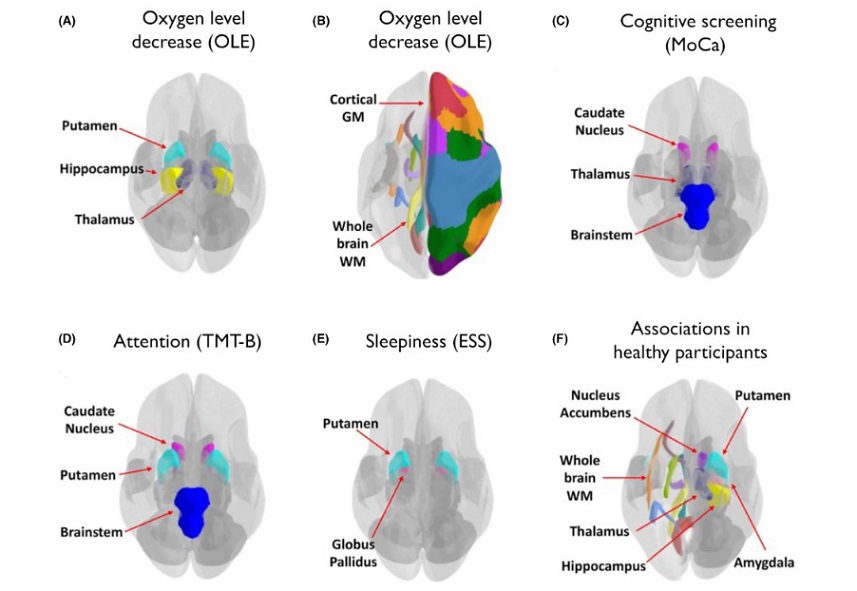SARS-CoV-2 Alters Brain Oxygen Levels And Causes Sleepiness And Attention Issues In Post-COVID Phase
Nikhil Prasad Fact checked by:Thailand Medical News Team Jun 16, 2024 10 months, 1 day, 13 hours, 28 minutes ago
COVID-19 News: Researchers have uncovered new insights into how COVID-19 affects the brain, even months after recovery. A study conducted by Dr Claudia Chien and colleagues at Charité - Universitätsmedizin Berlin explores how altered brain oxygen levels and blood flow relate to persistent symptoms like fatigue, sleepiness, and cognitive difficulties in post-COVID syndrome (PCS).
 Post-COVID Brain Oxygen Levels and Perfusion
Post-COVID Brain Oxygen Levels and Perfusion
Cerebral regions of interest related to cognitive and daytime sleepiness in patients with post-COVID syndrome and healthy participants. (A, B) Regional OLE increases indicating lower oxygen level found in post-COVID patients compared to healthy participants. Post-COVID patientbrain regional BOLD delay and/or OLE measurements (positively or negatively) associated with the (C) MoCA score, (D) with TMT-B times and (E)with the ESS score. (F) Regional OLE measures and BOLD delay times (positively or negatively) associated with the FSMC total score and/or ESS inhealthy participants. Colours in the image are based on different regional parcellations from different atlases, for example, different WM tracts ordifferent cortical GM regions. It should be noted that the atlas regions were not necessarily used in the study, and the MRI data were often notparcellated to such fine detailed regions in this study.
The Study and Its Goals
COVID-19 has left many people with lingering neurological symptoms, collectively known as post-COVID syndrome (PCS). These symptoms can include severe fatigue, sleep disorders, and cognitive impairments. To better understand the neurobiological changes behind these symptoms, the researchers used advanced imaging techniques to study brain function in 47 PCS patients compared to 47 healthy individuals.
Brain Oxygen Levels and Blood Flow
Using resting-state functional magnetic resonance imaging (rs-fMRI), the researchers measured brain oxygen levels and blood flow. They found that PCS patients had lower oxygen levels in several brain regions, particularly the white matter and grey matter. Interestingly, the brain blood flow, known as perfusion, did not show significant differences between PCS patients and healthy participants. However, the timing of blood flow in specific brain areas, such as the caudate nucleus, was linked to better executive function in PCS patients.
Fatigue and Sleepiness
A significant finding of the study was that many PCS patients experienced high levels of fatigue (79%) and daytime sleepiness (45%). The researchers discovered that decreased oxygen levels in the brain's putamen were associated with a reduced risk of poor cognitive outcomes. Conversely, lower oxygen levels in the thalamus were linked to a higher risk of cognitive fatigue.
Cognitive Performance
Cognitive impairments are a common complaint among PCS patients. The study revealed that delayed perfusion in the brain's grey matter and hippocampus was linked to a reduced risk of d
aytime sleepiness. This suggests that slower blood flow in these regions might be an adaptive mechanism to help the brain cope with the increased demands caused by the infection.
Potential Compensatory Mechanisms
The researchers believe that the lower regional brain oxygen levels observed in PCS patients indicate increased cerebral metabolism. This might be a compensatory response to the brain's higher energy demands after the infection. These hemodynamic changes were closely related to the severity of symptoms, suggesting that the brain's metabolism adapts to the ongoing challenges posed by PCS.
Implications for Future Research
This study covered in this
COVID-19 News report, highlights the importance of understanding cerebral hemodynamics in PCS. By identifying specific brain regions with altered oxygen levels and blood flow, the researchers have paved the way for future studies to develop targeted treatments for PCS symptoms. Understanding these changes is crucial for designing interventions that can help alleviate the long-term neurological effects of COVID-19.
Conclusion
The lingering effects of COVID-19 on brain function are profound and complex. The study by Chien and colleagues provides valuable insights into how altered brain oxygen levels and blood flow contribute to the persistent symptoms experienced by PCS patients. As research continues, these findings could lead to more effective treatments and improve the quality of life for those suffering from the long-term consequences of COVID-19.
The study findings were published in the peer reviewed journal: Annals of Clinical and Translational Neurology.
https://onlinelibrary.wiley.com/doi/10.1002/acn3.52121
For the latest
COVID-19 News, keep on logging to Thailand Medical News.
Read Also:
https://www.thailandmedical.news/news/covid-19-shrinks-your-brain
https://www.thailandmedical.news/news/how-sars-cov-2-sneaks-into-the-brain
https://www.thailandmedical.news/news/covid-19-news-german-and-swiss-study-finds-that-sars-cov-2-associated-t-cell-infiltrates-the-brain
